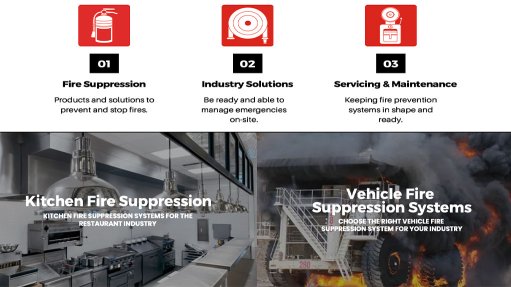Backlog in application process stifling drone industry in South Africa
The lack of urgency in processing commercial drone operating licences and the registering of drones is stifling the drone industry in South Africa, says Cape Town-based drone pilot training school UAV Industries director Ken Venn, who is also a board member of Commercial Unmanned Aircraft Association of Southern Africa, the commercial drone industry body.
“The processing of a remotely piloted aircraft systems (RPAS) operating licence can take 18 months, and the authority to fly a registered drone nine months. With a manned aircraft, it can take one to three weeks to process a new aircraft’s paperwork if a company has an existing operating licence.”
The application process has five phases, the first of which includes submitting a letter of intent to the South African Civil Aviation Authority (SACAA) and applying for a domestic air service licence at the Air Service Licensing Council. A company requires R500 000 insurance per aircraft and five post holders: a CEO or accountable manager, a person responsible for flight operations who holds a remote piloting licence, a person responsible for the aircraft, a quality manager, a safety manager and a security manager.
The second phase includes the application being published in the Government Gazette for 21 days, and then the applicant will be invited to the council to discuss their application. After the council meeting, the formal application is then submitted with the CA101-10 form, or prospective operator's pre-assessment statement, to the SACAA. This form details the company’s location and area of operations, as well as the types of aircraft to be used. There is then a formal meeting with SACAA to discuss the application process, any omissions or discrepancies.
Phase three starts when the formal application is approved. An operations manual, the application for an RPAS operating certificate and the application for an RPAS letter of approval must then be submitted. If the manual is accepted, phase four starts, and this entails the inspection or demonstration phase. In this phase, the applicant company needs to demonstrate the ability to comply with the SACAA drone regulations, the company’s operations manual and safe operating practices.
In phase five, if all the documents and demonstration and inspection from previous phrases comply with legislation, and the applicant has received the required Air Service Licence, the applicant will be issued with a Remote Operating Certificate.
Since South Africa introduced legislation for drones in 2015, only the 24 companies currently licensed have been processed to operate legal commercial drone operations. The list of legal operators can be found on SACAA’s website. According to SACAA there have been about 300 companies that have applied for RPAS licences in South Africa, but only 40 are being processed currently, says Venn.
Further, the growth in the drone industry is outstripping the SACAA’s capability to process applications. “The aviation industry generally plans for an industry growth of gross domestic product, plus 5%, and will use this when allocating resources and planning for growth. However, a start-up drone company can grow over 100% in the first year. Most of the start-ups we have observed in the industry have grown 100% in the first year of operating or are projected to,” Venn claims.
As a solution, he suggests that the application process could be digitised and applications incentivised. “For example, if drone companies registered each drone flight with SACAA, they would be able to see how many flights the drones take, and it allows for an alternate revenue model to be enabled in the industry,” Venn puts forward.
Further, registering drone flights would also enable the SACAA to monitor compliance in drone companies and operations at a lower cost than the current manual audit process.
“We need the SACAA to unshackle the industry and allow drone companies to reach their full growth potential,” Venn concludes.
Article Enquiry
Email Article
Save Article
Feedback
To advertise email advertising@creamermedia.co.za or click here
Press Office
Announcements
What's On
Subscribe to improve your user experience...
Option 1 (equivalent of R125 a month):
Receive a weekly copy of Creamer Media's Engineering News & Mining Weekly magazine
(print copy for those in South Africa and e-magazine for those outside of South Africa)
Receive daily email newsletters
Access to full search results
Access archive of magazine back copies
Access to Projects in Progress
Access to ONE Research Report of your choice in PDF format
Option 2 (equivalent of R375 a month):
All benefits from Option 1
PLUS
Access to Creamer Media's Research Channel Africa for ALL Research Reports, in PDF format, on various industrial and mining sectors
including Electricity; Water; Energy Transition; Hydrogen; Roads, Rail and Ports; Coal; Gold; Platinum; Battery Metals; etc.
Already a subscriber?
Forgotten your password?
Receive weekly copy of Creamer Media's Engineering News & Mining Weekly magazine (print copy for those in South Africa and e-magazine for those outside of South Africa)
➕
Recieve daily email newsletters
➕
Access to full search results
➕
Access archive of magazine back copies
➕
Access to Projects in Progress
➕
Access to ONE Research Report of your choice in PDF format
RESEARCH CHANNEL AFRICA
R4500 (equivalent of R375 a month)
SUBSCRIBEAll benefits from Option 1
➕
Access to Creamer Media's Research Channel Africa for ALL Research Reports on various industrial and mining sectors, in PDF format, including on:
Electricity
➕
Water
➕
Energy Transition
➕
Hydrogen
➕
Roads, Rail and Ports
➕
Coal
➕
Gold
➕
Platinum
➕
Battery Metals
➕
etc.
Receive all benefits from Option 1 or Option 2 delivered to numerous people at your company
➕
Multiple User names and Passwords for simultaneous log-ins
➕
Intranet integration access to all in your organisation
















